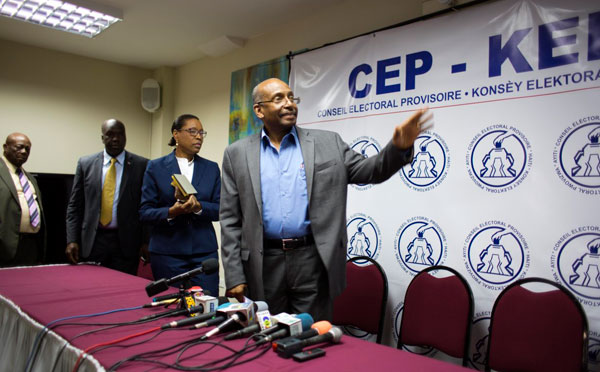Campaigning for Haiti’s Oct. 9 presidential elections has gotten off to a timid start with the French-speaking Caribbean country’s elections chief asking candidates and political parties to campaign fairly and avert elections-related violence, according to reports here.
Léopold Berlanger also reiterated that there will be stricter controls on the balloting, which includes voting for one portion of the 30-member Senate and runoffs for several legislative seats, according to the Miami Herald.
“There will be no voting wherever you like,” said Berlanger said, referring to poll watchers, also known as mandataires, who were allowed to vote at any polling stations in last year’s disputed vote, triggering allegations of fraud and plunging the country into a political crisis.
No one will have the right to do this,” the Herald quoted Berlanger as saying.
Berlanger also told the paper that the voter list — now at 6.1 million voters — is ready, and that the number of polling stations has been reduced to provide voters with more space and privacy to cast ballots.
“We are making a lot of effort for these elections to be done another way,” he said, urging Haitians to “show all the other countries that we can take control of our own affairs.”
Last week, elections authorities finally released details of the US$55 million budget, US$48.5 million of which will be cobbled together with funds from several public agencies, including the port and the central bank, the Herald said.
Despite assurances that the repeatedly postponed vote will finally happen, the paper said doubts still persist over whether Haiti will be able to pull off the balloting without international financing.
Recently, the country announced a hike in gas prices, causing politicians to take the airwaves to denounce the move, the Herald said.
At the same time, it said several corruption probes also threaten to derail the process.
“We hope and we trust that they are very serious when they say the elections are going to take place,” said Brazil’s ambassador to Haiti, Fernando Vidal. “It would be catastrophic if there are no elections in October.”
This is the first time in years that Haiti will have to pay for its own elections, according to the Herald.
It noted that, last month, the United States announced that it would not provide funding and demanded the return of nearly US$2 million in unspent elections financing from the US$33 million it shelled out in last year’s disputed vote.
The US Department of State had disagreed with the decision of Haiti’s Provisional Electoral Council to annul last year’s first round presidential vote, which pitted then government-backed candidate Jovenel Moïse and opposition leader Jude Célestin in a second round, the Herald said.
Candidates this time have 45 days rather than the customary 30 days to woo voters, “and most seem to be leaving their debut rallies for later in the week,” stated the Herald.
Officially, 27 candidates are contesting the poll, which also includes runoffs for dozens of unresolved legislative seats and a vote for 10 Senate seats, featuring 149 candidates.
Runoffs for the Senate seats and the presidency — if no presidential candidate gets 50 percent plus 1 — will be held on Jan. 8, along with an election for thousands of municipal seats, according to the Herald.
On Monday, Aug.22, a delegation from the Organization of American States Electoral Observation Mission arrived here to begin observing the process, the Herald said.

























